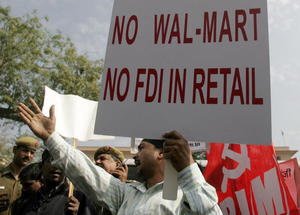India has still not made any commitment to the World Trade Organisation to liberalise its retailing services. Nevertheless, the state continues to advance policies to liberalise and corporatise the sector. India now allows 100% foreign direct investment (FDI) in wholesale trading, single brand retailing and business to business e-commerce.
Click here to read this full issue of Supermarketwatch Asia
The previous central government signed into being legislation allowing FDI in multi brand retailing up to 51%, but through the government route- requires prior approval of the central Government which are considered by the Foreign Investment Promotion Board (FIPB), Department of Economic Affairs, Ministry of Finance- and with some riders. The present central government, led by the Bhartiya Janata Party (BJP), was and, in principle, still is against its predecessor’s decision to allow 51% FDI in multi-brand retail. But the consolidated FDI policy of the present BJP led government has not reversed the earlier decision. Instead, the Indian government is further liberalising the sector. The new Indian government has eased FDI norms and the conditions on minimum capitalisation. Floor area restrictions have also now been removed for the construction of shopping complexes.
Up to 100% FDI is now allowed in coffee/rubber/cardamom/palm oil and olive oil plantations via the automatic route- without prior approval either of the Central Government or the Reserve Bank of India. Manufacturers can now sell their products through wholesale and/or retail, including through e-commerce without Government Approval. The new FDI policy has also relaxed the domestic sourcing conditions for single-brand retailers. Single brand retailers are not required to meet the 30% sourcing condition until they open their first store. In case of state of the art and cutting edge technology, the sourcing condition has been removed. The policy also allows a single entity to do both wholesale trading and single-brand retailing provided both business arms separately comply with the relevant regulations.
All these recent policy changes are important indicators of the political shift by the BJP which, when it was in opposition, was vehemently opposed to the liberalisation of retail from the parliament to the streets. The election manifesto of the party categorically says that it welcomes FDI in all sectors except in multi-brand retail. Central ministers including the Minister for Commerce and Industry and senior leaders of the party still publicly announce their staunch opposition to allowing FDI in retail and claim that the present government will not allow any foreign superstores even if there is such a policy. If it is so, why then is the government opening doors for foreign superstores by allowing them to set up multi-brand stores at airports and in special economic zones? Allowing superstores with cutting edge technology may result in also allowing them in food and grocery as processing and packaging of food and grocery involve high technology. What about the election promises of protecting independent small retailers? Was the opposition to FDI in retail only an opportunist strategy? The ruling party will have to answer such questions to the electorate of the so-called largest democracy of the world whenever it next contests elections.
Contact:
Dharmendra Kumar, FDI Watch
dkfordignity [at] gmail.com
This article is from Supermarketwatch Asia, a quarterly email bulletin for social movements about developments in food retail and distribution in Asia produced by GRAIN (Issue No. 1, January 2016) Click here to subscribe.
